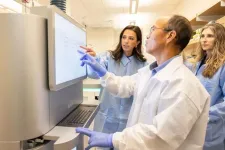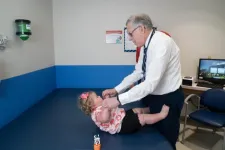(Press-News.org) HOUSTON ― The University of Texas MD Anderson Cancer Center and Texas Children’s Hospital have announced a transformational collaboration dedicated solely to pediatric cancer care. Approved by the UT System Board of Regents and the Texas Children’s Board of Trustees, this new, first-of-its-kind joint venture will unite the nation’s largest comprehensive pediatric system and a top pediatric cancer program with the nation’s leading comprehensive cancer center. The collaboration has a single mission: to end childhood cancer.
“The scope and scale of our combined effort will build the world’s preeminent pediatric cancer center, addressing the growing need for excellent patient care and greatly benefiting children with cancer through increased access to care and to clinical trials,” said Peter WT Pisters, M.D., president of MD Anderson. “MD Anderson and Texas Children’s offer unique strengths that when brought together will accelerate improved outcomes for patients in Texas and around the world.”
Collaborative operations and patient care will launch in early 2026. A focus on new facilities is required to offer patients and their families a best-in-class healing environment with the latest medical technology designed specifically with them in mind. Specifics are not yet established but will be forthcoming. The combination of Texas Children’s and MD Anderson patient populations will increase pediatric cancer clinical trials, ultimately expediting discoveries and enhancing the availability of innovative cancer treatments. Texas has one of the youngest and fastest growing populations in the country and has the second most total pediatric cancer cases in the United States, creating a significant opportunity for scientific advancement through this joint venture.
“This groundbreaking collaboration between two proven leaders in pediatric and cancer care marks the beginning of a new era in the fight against childhood cancer,” says Debra F. Sukin, Ph.D., president and chief executive officer of Texas Children’s. “The combined force of our two iconic programs will be led with the nation’s top talent—from clinicians and researchers to nurses and administrative professionals—each committed to realizing the shared mission of eradicating pediatric cancer.”
While the two organizations have collaborated for years, this new effort will expand access while offering the nation’s largest complement of pediatric subspecialty care and services to children diagnosed with all types of cancer within a single program. More than 200 Texas Children’s pediatric oncology specialists, who are full time faculty with Baylor College of Medicine, and over 100 MD Anderson pediatric clinicians and researchers will together advance this transformational care team. The collaboration will also feature pediatric oncology education programs aimed at training and expanding the next-generation pediatric oncology care team who will be key in our bold goal of eliminating childhood cancer.
Read this press release in the MD Anderson Newsroom.
-30-
About Texas Children’s Hospital
Texas Children's, a nonprofit health care organization, is committed to creating a healthier future for children and women throughout the global community by leading in patient care, education and research. Consistently ranked as the best children's hospital in Texas and among the top in the nation, Texas Children's has garnered widespread recognition for its expertise and breakthroughs in pediatric and women's health. The system includes the Texas Children's Duncan NRI; the Feigin Tower for pediatric research; Texas Children's Pavilion for Women, a comprehensive obstetrics/gynecology facility focusing on high-risk births; Texas Children's Hospital West Campus, a community hospital in suburban West Houston; Texas Children's Hospital The Woodlands, the first hospital devoted to children's care for communities north of Houston and Texas Children's Hospital North Austin, the new state-of-the-art facility providing world-class pediatric and maternal care to Austin families. The organization also created Texas Children's Health Plan, the nation's first HMO focused on children; Texas Children's Pediatrics, the largest pediatric primary care network in the country; Texas Children's Urgent Care clinics that specialize in after-hours care tailored specifically for children; and a global health program that is channeling care to children and women all over the world. Texas Children's Hospital is affiliated with Baylor College of Medicine. For more information, visit TexasChildrens.org.
About MD Anderson
The University of Texas MD Anderson Cancer Center in Houston ranks as one of the world's most respected centers focused on cancer patient care, research, education and prevention. The institution’s sole mission is to end cancer for patients and their families around the world, and, in 1971, it became one of the nation’s first National Cancer Institute (NCI)-designated comprehensive cancer centers. MD Anderson is No. 1 for cancer in U.S. News & World Report’s “Best Hospitals” rankings and has been named one of the nation’s top two hospitals for cancer since the rankings began in 1990. MD Anderson receives a cancer center support grant from the NCI of the National Institutes of Health (P30 CA016672).
END
UT MD Anderson and Texas Children’s Hospital announce joint venture to end childhood cancer
2025-02-20
ELSE PRESS RELEASES FROM THIS DATE:
Texas Children’s Hospital and UT MD Anderson announce joint venture to end childhood cancer
2025-02-20
HOUSTON, TX (February 19, 2025) – Texas Children’s Hospital and The University of Texas MD Anderson Cancer Center have announced a transformational collaboration dedicated solely to pediatric cancer care. Approved by the Texas Children’s Board of Trustees and the UT System Board of Regents, this new, first-of-its-kind joint venture will unite the nation’s largest comprehensive pediatric system and a top pediatric cancer program with the nation’s leading comprehensive cancer center. The collaboration has a single mission: to end childhood cancer.
“The scope and scale of our combined effort will build the world’s preeminent pediatric cancer ...
New medication sinus thrombosis just as safe but more patient-friendly
2025-02-20
Patients affected by sinus thrombosis are treated with blood thinners. Traditionally, these patients are prescribed vitamin K antagonists (VKAs). In order to give the correct dosage, regular check-ups at the thrombosis service are necessary. A global study, coordinated by Amsterdam UMC, now shows that new medication, direct oral anticoagulants (DOACs), are equally safe and effective. The study was published today in The Lancet Neurology.
A big advantage is that this medication is more user-friendly because regular thrombosis monitoring is no longer ...
About 740,000 global deaths from suicide occur annually--that's one death every 43 seconds
2025-02-20
Every minute, four males and six females need inpatient treatment due to suicide attempts around the world.
Males die from suicide at twice the rate of females, and their attempts result in death three times more often than female attempts.
Globally, 10% of suicides by males and 3% by females were with guns. In the U.S., 55% by males and 31% by females were with guns.
Between 1990 and 2021, the global age-standardized death rate for suicide declined by almost 40%, indicating that intervention and prevention are ...
Experts strongly recommend against spine injections for chronic back pain
2025-02-20
Spine injections should not be given to adults with chronic back pain because they provide little or no pain relief compared with sham injections, say a panel of international experts in The BMJ today.
Their strong recommendations apply to procedures such as epidural steroid injections and nerve blocks for people living with chronic back pain (lasting at least 3 months) that is not associated with cancer, infection or inflammatory arthritis.
Their advice is based on the latest evidence and is part of The BMJ’s ‘Rapid ...
Racism in medicine - are things getting better?
2025-02-20
Five years on since The BMJ’s special issue on racism in medicine, and a global pandemic, the landscape is very different, but has racism in the NHS and UK medicine got better or worse?
In 2020, a BMJ investigation found that UK medical schools were failing to deal with complaints of racism. Another round of requests to the UK’s 46 medical schools has now found that eight in 10 (34 of 41 that responded) are collecting data on complaints about racism, up from half in 2020. And the number ...
Forcing UK creatives to ‘opt out’ of AI training risks stifling new talent
2025-02-20
The UK government should resist allowing AI companies to scrape all copyrighted works unless the holder has actively “opted out”, as it puts an unfair burden on up-and-coming creative talents who lack the skills and resources to meet legal requirements.
This is according to a new report from University of Cambridge experts in economics, policy and machine learning, who also argue the UK government should clearly state that only a human author can hold copyright – even when AI has been heavily involved.
A collaboration between three Cambridge initiatives – ...
Almost 90% of people would agree to genetic testing to tailor medication use, survey finds
2025-02-20
New research shows almost 90% of people in England would agree to genetic testing to get the most effective medication and reduce the risk of side effects
85% thought that the NHS should offer pharmacogenomic testing to people with multiple health conditions
58% of people thought that the NHS should offer this testing to everyone
91% wanted access to their own pharmacogenomic data, with many wanting this via the NHS app
Pharmacogenomics – an individual’s genetic response to medications – is an increasingly important strand of personalised healthcare but little is known about the public's views ...
Study: UTA research drives widespread economic impact
2025-02-19
University of Texas at Arlington research projects contributed $59 million to the national economy in 2024—an increase of 39% from 2023, according to a new report from the Institute for Research on Innovation and Science (IRIS).
UTA has invested heavily in research infrastructure, purchasing cutting-edge scientific equipment and technology, such as North Texas’ most advanced gene sequencer and a super-sensitive magnetic resonance imaging machine for the Clinical Imaging Research Center. The funds also support collaboration with other research organizations.
UTA worked through 1,144 unique ...
Promising results from first prenatal therapy for spinal muscular atrophy
2025-02-19
(MEMPHIS, Tenn. – February 19, 2025) Spinal muscular atrophy (SMA) is a progressive neurodegenerative disorder set in motion before birth. Scientists at St. Jude Children’s Research Hospital led the first in uterotreatment of SMA with the orally administered drug risdiplam. More than two years after the child was born, no identifiable features of SMA have been observed. This study demonstrates the feasibility of treating SMA prenatally and supports further investigation into the approach. The findings were published ...
Nitrogen fixation on marine particles is important in the global ocean
2025-02-19
How on Earth?
It has puzzled scientists for years whether and how bacteria, that live from dissolved organic matter in marine waters, can carry out N2 fixation. It was assumed that the high levels of oxygen combined with the low amount of dissolved organic matter in the marine water column would prevent the anaerobic and energy consuming N2 fixation.
Already in the 1980s it was suggested that aggregates, so-called “marine snow particles”, could possibly be suitable sites for N2fixation, ...


